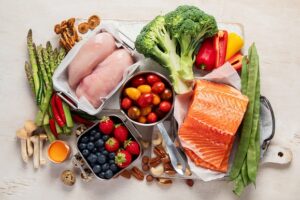2025 Doulas of the Valley, LLC
Proper Diet Plan for Pregnancy
Blogs
Proper Diet Plan for Pregnancy
Pregnancy is a unique and precious time that requires special attention to your health, particularly when it comes to your diet. A proper diet plan for pregnancy supports both your own well-being and the optimal development of your baby. At Doulas of the Valley, we believe that informed choices lead to healthier pregnancies. This guide will walk you through the essentials of eating well during pregnancy, including nutrient recommendations, meal ideas, and dispelling common myths.
Why Your Pregnancy Diet Matters
The Role of Nutrition in a Healthy Pregnancy
Good nutrition lays the foundation for a healthy pregnancy. During this period, your body requires additional calories and nutrients to support the growth of your baby while maintaining your own health. Eating nutrient-dense foods ensures that you have the energy to meet the demands of pregnancy and reduces the risk of complications, such as gestational diabetes and preeclampsia.
How Your Baby Benefits from a Balanced Diet
Your baby depends on you for all their nutrients. A balanced diet fosters proper brain development, builds strong bones, and supports healthy weight gain. By following a proper diet plan for pregnancy, you create an environment that promotes the best possible start in life for your child.
Key Nutrients to Focus On During Pregnancy
 Protein and Iron for Growth and Energy
Protein and Iron for Growth and Energy
Protein plays a critical role in the growth of fetal tissues, including the brain, and supports maternal tissues like the uterus and blood supply. Iron, on the other hand, is vital for producing red blood cells that carry oxygen to your baby. Lean meats, beans, tofu, and eggs are excellent sources of both nutrients.
Folic Acid and DHA for Brain Development
Folic acid is essential for preventing neural tube defects, while DHA (an omega-3 fatty acid) supports brain development and vision. You can find folic acid in fortified cereals and green leafy vegetables, and DHA in fatty fish like salmon or through prenatal supplements.
Calcium and Vitamin D for Bone Health
Calcium builds strong bones and teeth, while Vitamin D helps your body absorb Calcium effectively. Dairy products, fortified plant-based milks, and leafy greens are good sources of Calcium, while Vitamin D can be synthesized through sunlight or obtained from fortified foods.
Anti-Inflammatory Diet During Pregnancy
What Is an Anti-Inflammatory Diet and Why Consider It?
An anti-inflammatory diet focuses on reducing inflammation in the body, which can help manage conditions like swelling or pregnancy complications such as preeclampsia. This diet prioritizes whole, unprocessed foods that promote overall health.
Foods to Embrace: Leafy Greens, Berries, Whole Grains
To adopt an anti-inflammatory diet during pregnancy, include leafy greens like spinach and kale, antioxidant-rich berries, and whole grains such as quinoa and oatmeal. These foods are nutrient-packed and support both maternal and fetal health.
Foods to Limit or Avoid
Limit processed foods, refined sugars, and saturated fats, as they may contribute to inflammation. Avoid trans fats and excessive sodium, and try to cook meals at home as much as possible to ensure you control the ingredients.
Sample Pregnancy Diet Meal Plan
Example Meal Plan for the First Trimester
- Breakfast: Greek yogurt with granola, mixed berries, and a drizzle of honey
- Snack: Handful of almonds and a piece of fruit
- Lunch: Grilled chicken salad with leafy greens, cherry tomatoes, and olive oil dressing
- Dinner: Baked salmon with quinoa and steamed broccoli
- Snack: A slice of whole-grain toast with avocado
Adjustments for the Second and Third Trimesters
As your baby grows, your caloric needs increase. Add an extra snack or slightly larger portions to meet these demands. For example, include an additional boiled egg or smoothie with your meals.
Hydration and Snack Ideas
Hydration is just as critical as nutrition. Aim for 8-12 cups of water daily. Healthy snack ideas include hummus with raw veggies, peanut butter on apple slices, or homemade trail mix.
Common Pregnancy Diet Myths
 “Eating for Two” and Other Misconceptions
“Eating for Two” and Other Misconceptions
The phrase “eating for two” often leads to overeating, but in reality, your body only needs about 300 extra calories per day in the second trimester and slightly more in the third. Focus on quality over quantity to maintain a healthy weight.
Cravings vs. Nutritional Needs
Pregnancy cravings are real, but they often stem from hormonal changes rather than nutrient deficiencies. Satisfy cravings mindfully by incorporating healthy alternatives. For example, if you crave sweets, try a fruit smoothie or yogurt parfait.
Talk to a Professional Before Making Major Changes
Why Consulting a Nutritionist Matters
A registered nutritionist can provide a tailor-made pregnancy diet plan suited to your specific needs. They can address unique concerns, such as food aversions, allergies, or health conditions, ensuring you and your baby get all the nutrients required.
Speak with Your Doctor for Personalized Advice
While general guidelines are helpful, always consult your healthcare provider before making significant dietary or lifestyle changes during pregnancy. Your doctor can factor in medical history and monitor your progress closely.
Doulas of the Valley: Supporting You Beyond Birth
At Doulas of the Valley, our goal is to provide support during pregnancy, including expert advice on nutrition. We’re here to guide you through this special time, ensuring you feel empowered to make the best decisions for yourself and your baby.
Following a proper diet plan for pregnancy is one of the best ways to care for yourself and your little one. By focusing on key nutrients, considering an anti-inflammatory diet, and consulting with professionals, you’re setting the stage for a healthy, happy pregnancy.
